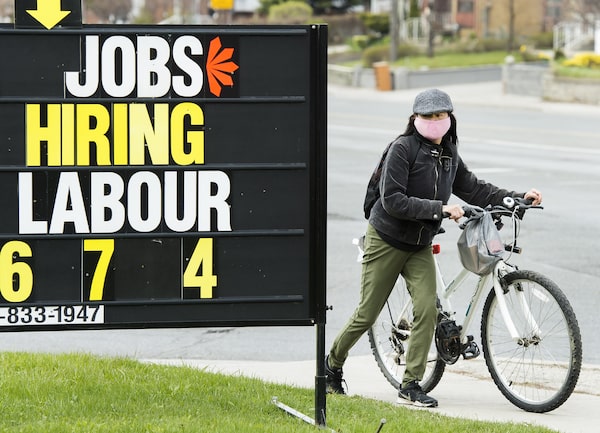
A woman checks out a jobs advertisement sign during the COVID-19 pandemic in Toronto on April 29, 2020.Nathan Denette/The Canadian Press
Lisa Lalande is chief executive of Century Initiative. Pedro Barata is executive director of the Future Skills Centre.
With COVID-19 receding, the possibility of an economic downturn is becoming a stronger reality. The majority of Canadian financial institutions are predicting a slowdown in the next year.
Whenever it comes, we can expect governments to implement policies and programs to try to lessen the immediate impacts of job losses. But if this response follows the same pattern as in previous recessions and periods of tight labour markets, even a strong approach will leave half the job undone.
While the short-term slowdown effects of layoffs and cutbacks make headlines, the long-term impacts typically go unnoticed and unaddressed. The lasting scars of economic shocks, particularly for young people, lead to lower lifetime earnings and increased social exclusion, undermining Canadians’ economic, physical and mental health.
On Monday, Century Initiative launched our third National Scorecard on Canada’s Growth and Prosperity. The scorecard highlights where Canada’s long-term prosperity is on track and where there are risks. And for young people, labour markets are already lagging – something that could be amplified with a likely slowing of the economy, including a potential recession.
In light of these warning signs, Century Initiative is focusing on the long-term labour market scarring on youth after economic shocks. Together with the Future Skills Centre, we’re looking beyond the immediate aftermath of economic changes to help shape long-term responses to the dislocation and underemployment faced by young people in Canada.
The effects of negative labour market trends on youth are significant. When young people graduate and/or enter a weak labour market, they compete with more job seekers for fewer jobs. Some employers see this as an opportunity to raise the skill requirements for open positions, meaning any job a new graduate does get will often come with lower pay, and fewer training and promotion opportunities.
This labour market scarring can have lasting impacts on a person’s earnings and career opportunities. According to an American Economic Journal: Applied Economics study, simply having the unfortunate timing of graduating into a recession can account for continuing losses in earnings well after the economy picks up again. It’s also been shown that long periods of unemployment can harm a person’s ability to land future work, weakening their ties to the labour market.
High youth unemployment during economic hard times also risks a person’s well-being and social inclusion. Research shows there is a clear and significant mental-health decline immediately after a period of unemployment as a young person, and that the decline can linger well into a person’s mid-life.
Some youth can be more severely affected than others. For example, young people with lower levels of education suffer even larger losses of earnings. And while COVID-19 shutdowns disproportionately impacted all young people, women and racialized youth experienced the highest rates of unemployment.
Such groups are therefore at greater risk of experiencing the lasting effects on their mental and physical health. Another potential recession following closely after recent COVID-19 job losses could compound these inequalities, and cause setbacks in gender and racial equality in Canada.
The individual consequences of unemployment also harm Canada’s economy and our collective well-being as a society. When fewer people are in the work force or working at their full potential, our economy is less productive. Research shows that long-term unemployment is associated with, and can increase, the risk of homelessness, interactions with the justice system and mental-health challenges.
Typical government responses to economic slowdowns involve short-term initiatives that wrap up as economic conditions improve. Even the unprecedented responses to prevent job losses during COVID-19 such as the Canada Emergency Wage Subsidy did not take into account these lasting effects.
A very tight labour market is unlikely to cancel out these challenges, especially for younger people with a less stable footing in the job market. In fact, even the short-term responses are less likely to be available to young people just entering the labour market or working in gig-type roles.
If we want any chance of a swift and effective response to the next economic downturn, the time to act is now – not after it arrives. Thinking critically about a long-term policy response can help to prepare Canada for what may come and create worthwhile individual and societal benefits.
Failing to deal with the long-term scarring of slowdowns, including being prepared for the hard impacts of recessions on youth, isn’t just bad for young people; it’s bad for all Canadians, today and in the future. Building a bigger, bolder Canada tomorrow starts with bold policy moves today.